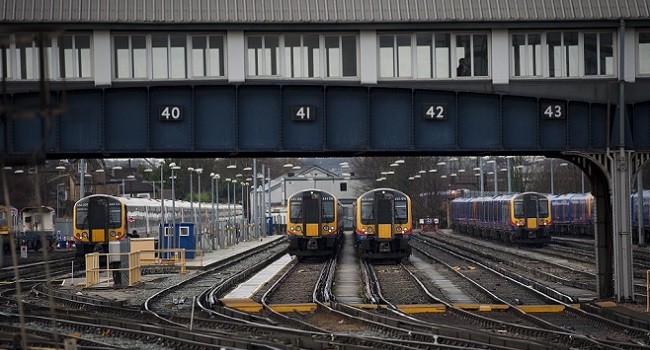Britain’s privatised railway sector that drove the Industrial Revolution and was rescued by the state in March owing to coronavirus-ravaged demand, faces a major overhaul under government plans unveiled Monday.
While UK train services will continue to be run mainly by private companies, the franchising system will be replaced by Emergency Recovery Management Agreements (ERMA) as the virus derails demand, the government said.
The Department for Transport said it would continue to cover losses suffered by private rail operators over the next 18 months, extending a system begun following the start of the virus outbreak in Britain.
“Ministers today ended rail franchising after 24 years as the first step in bringing Britain’s fragmented network back together,” the DfT said in a statement.
Read Also: North Korea’s Kim Issues Warning On Coronavirus Influx
“The new system will create a simpler, more effective structure and will take shape over the coming months.”
The franchising system has been long-criticised by passenger groups, who accuse private companies of charging excessive fares for regularly-delayed train services despite earning large state-subsidies.
Despite long-standing government help, the taxpayer has in recent years been forced to take over several franchises that ran into financial trouble, such as Northern Trains and London North Eastern Railway.
– ‘No longer working’ –
With Covid-19 decimating passenger demand, Prime Minister Boris Johnson’s Conservative government has already paid out a reported £3.5 billion ($4.5 billion, 3.8 billion euros) to support private rail operators.
Transport Secretary Grant Shapps indicated Monday said that the privatised rail model was not working in the current climate, as many commuters choose to work at home and travellers cancel their plans.
“The model of privatisation adopted 25 years ago has seen significant rises in passenger numbers, but this pandemic has proven that it is no longer working,” Shapps said.
The new system will keep the best elements of the private sector but add better direction and accountability, he insisted.
And the DfT warned: “Until passenger numbers return, significant taxpayer support will still be needed.”
Rail operators will still be paid management fees for running services under the ERMA system — but these will be lower than under emergency measures that were implemented in March.
Keith Williams, a former British Airways boss commissioned by the government to review the sector, welcomed the new strategy.
“These new agreements represent the end of the complicated franchising system, demand more from the expertise and skills of the private sector, and ensure passengers return to a more punctual and co-ordinated railway,” he said.
However, trade unions slammed the move, which is the first major sector-wide overhaul since the Conservatives privatised British Rail in the mid-1990s.
“This announcement should now force the government’s hand and lead them to face up to what has been staring them in the face for the best part of three decades,” said Rail, Maritime and Transport union general secretary Mick Cash.
“Public ownership is the only model that works and can steer us through a crisis such as Covid-19,” he added.
Lawmaker Tan Dhesi, rail spokesman for the opposition Labour party, argued it was “completely unacceptable” that taxpayers continue to pay “hundreds of millions of pounds” in management fees to private rail companies — and urged the government to bring all rail services back into public ownership.
AFP
